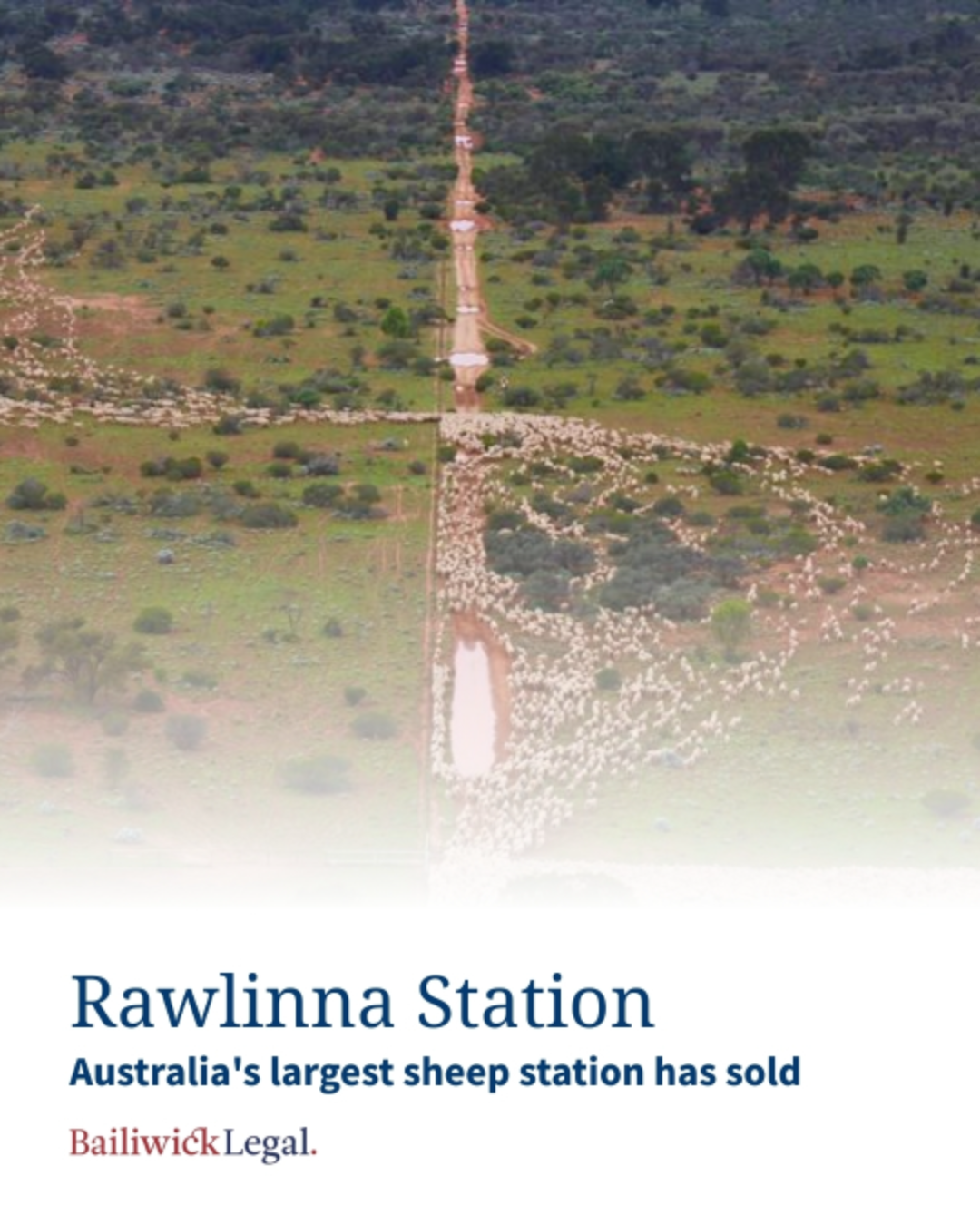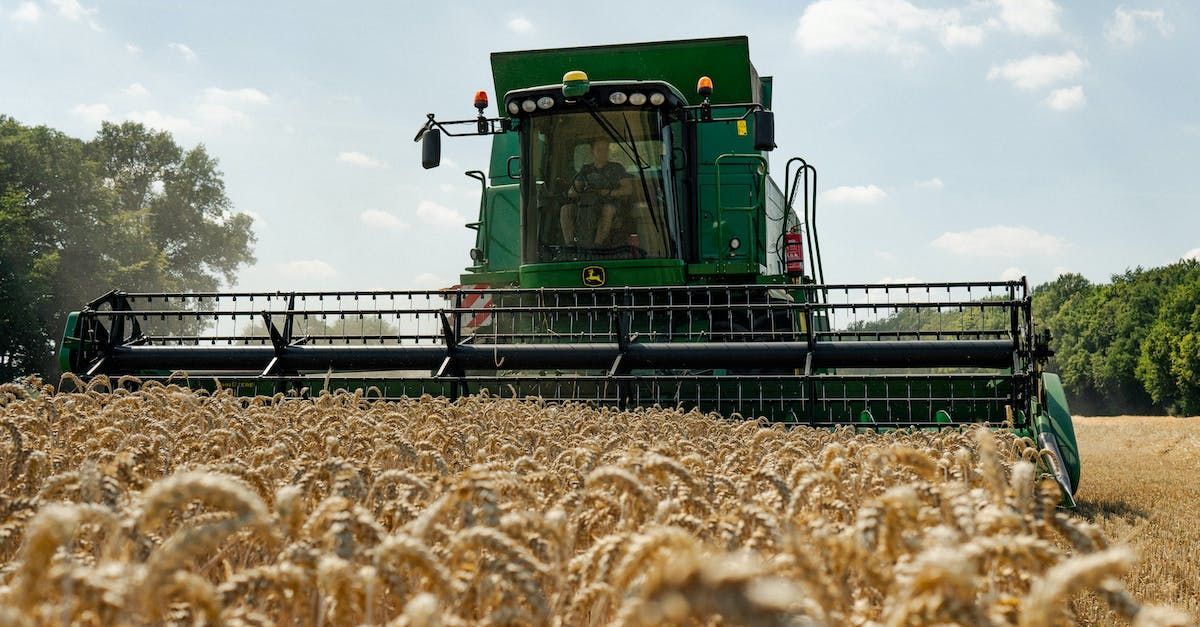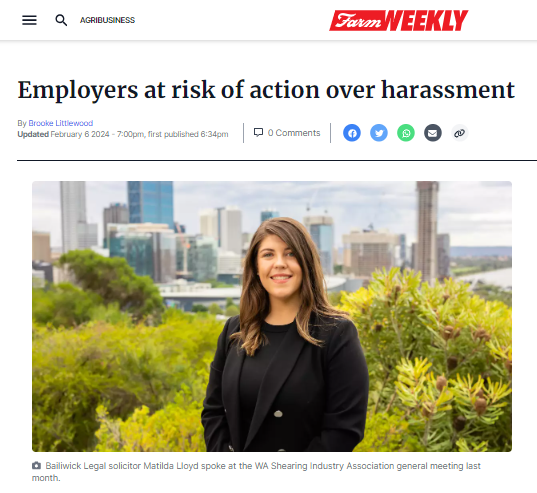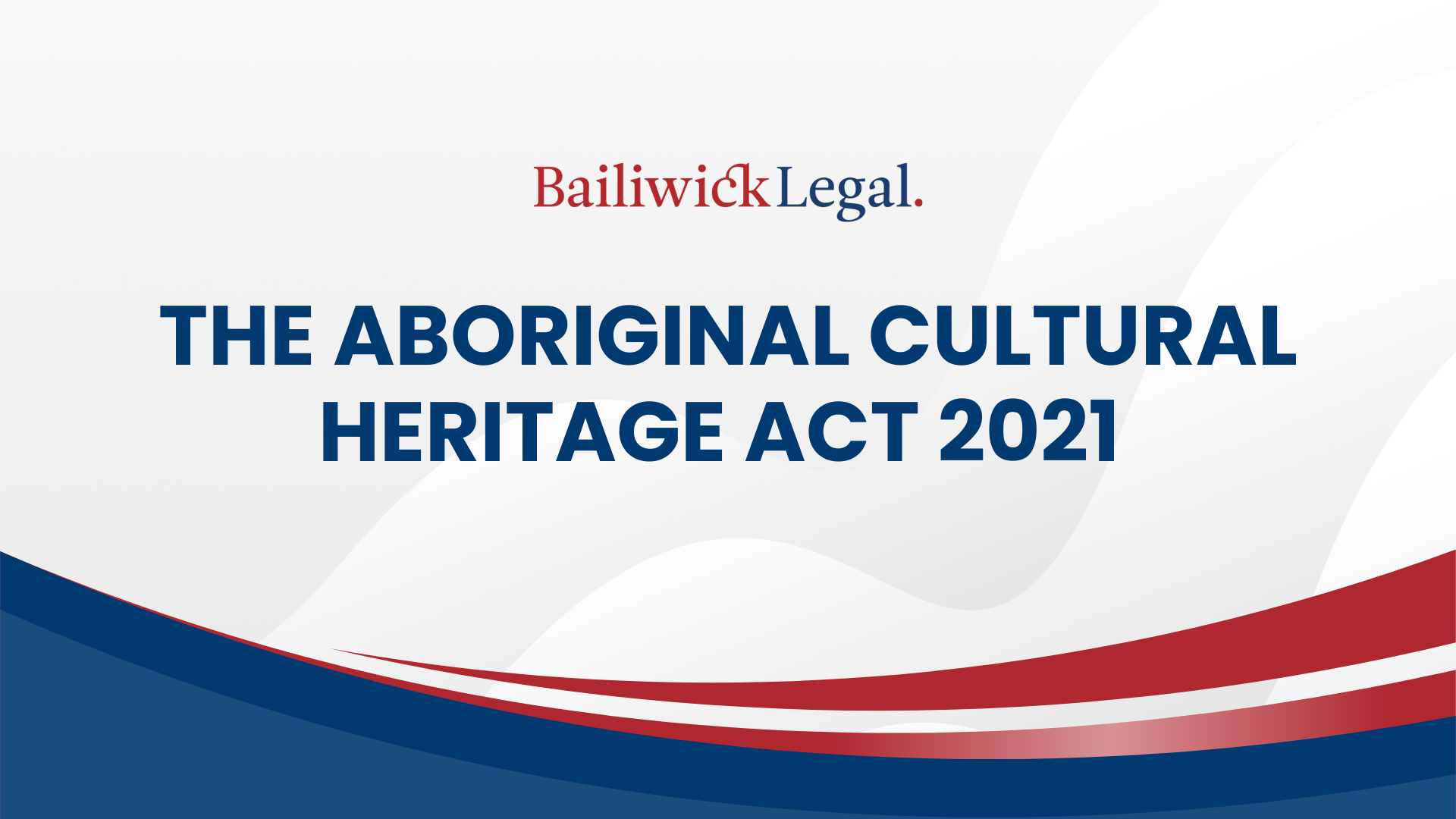News
Keep up-to-date with the latest in legal news

Bailiwick Legal Advises on Landmark Acquisition of Rawlinna Station by Consolidated Pastoral Company
Bailiwick Legal is proud to have acted for Consolidated Pastoral Company (CPC) in its successful acquisition of Rawlinna Station , Australia’s largest sheep station, located on the remote Nullarbor Plain in Western Australia. Spanning over 1 million hectares and running approximately 30,000 sheep , Rawlinna is an iconic pastoral asset with a rich legacy, having been held by the MacLachlan family’s Jumbuck Pastoral Company since its establishment in 1962. The sale marks the first change of ownership in over six decades and was finalised following formal approval from the Western Australian Government for the transfer of the pastoral leases. This transaction involved navigating: The transfer of three separate pastoral leases Coordination across multiple vendor entities Consideration of livestock and operating assets Fulfilment of regulatory and compliance requirements, including WA lease approval processes Bailiwick Legal is a boutique agricultural and regional law firm , proudly based in Perth and Bridgetown, Western Australia. Our role in this acquisition demonstrates that deep sector knowledge, local insight, and personalised legal support are crucial for agribusiness clients managing complex, high-value transactions. Our team, led by our regionally-based solicitor, Matilda Lloyd, provided end-to-end legal and strategic support, including: Due diligence on land tenure and operating assets Contract negotiation and preparation Advice on regulatory approvals and compliance Strategic coordination with CPC’s internal and external stakeholders to ensure a smooth and timely settlement We are honoured to have supported CPC in this milestone acquisition and look forward to watching Rawlinna’s next chapter unfolds. At Bailiwick Legal, we believe that regional expertise, deep industry knowledge, and relationship-based service remain essential to agribusiness success, no matter the scale. Congratulations to all parties involved, including the MacLachlan family, whose stewardship of Rawlinna leaves a lasting legacy in Australian agriculture. – The Bailiwick Legal Team Working alongside agribusinesses to grow, transition, and thrive . For assistance with all of your agribusiness needs, contact Bailiwick Legal on 08 9321 5451 or email office@bailiwicklegal.com.au By Matilda Lloyd (Associate) For further information about our legal services, please visit our website: https://www.bailiwicklegal.com.au The above information is a summary and overview of the matters discussed. This publication does not constitute legal advice and you should seek legal or other professional advice before acting or relying on any of the content.

The International Sustainability and Carbon Certification (ISCC) System has come to the attention of many Western Australian farmers recently, as the scheme has changed one of its policies regarding aerial spraying. What is the ISCC? The ISCC is one of the world’s largest voluntary sustainability certification schemes enabling participants to demonstrate they are producing materials in a sustainable way that meets or exceeds community expectations. In Australia it is widely used in the canola industry, enabling Australian canola growers to access the European biofuel market. CBH Marketing and Trading holds certification for the ISCC EU and ISCC PLUS programs, that cover canola, barley, oats, wheat and lupin, allowing WA growers to participate in both programs. Participating in the ISCC program can result in a premium on grain, however participants are subject to more stringent measures to satisfy sustainability accreditation requirements. Recent decision on aerial spraying ISCC Principle 2.6.2 prevents aerial spraying from taking place within 500 metres of a body of water. CBH has successfully lobbied for an exemption to this Principle, for farm dams and salt lakes of low ecological value. As part of its lobbying, CBH provided expert reports to the ISCC on the hydrology and ecology of WA farm systems. For farmers who are signed up to the ISCC program, this removes an obstacle during the season for weed management. The Principle does still require a 500 metre buffer for other bodies of water, including freshwater lakes, rivers, ponds or creeks. However, for those who farm yabbies and marron, this change may not be welcome. Marron and yabby farmers have noticed impacts on their populations where aerial spraying has taken place close to their properties, and aerial spraying can unintentionally damage natural vegetation, including young and old growth trees. For growers, it’s always prudent to follow best practice guidelines for aerial spraying to avoid spray drift – including monitoring weather conditions and the effect of water added to the chemical. For some farmers, this decision may prompt an examination of whether signing up to the ISCC program might be best for their business. In this circumstance, it is important to weigh up the potential benefits of the program compared to the sustainability accreditation requirements. For others, this decision is a timely reminder to stay up to date with best practice guidelines when it comes to spraying, particularly during the seeding season. For assistance with all of your agribusiness needs, contact Bailiwick Legal on 08 9321 5451 or email office@bailiwicklegal.com.au By Ciara Nalty (Solicitor) For further information about our legal services, please visit our website: https://www.bailiwicklegal.com.au The above information is a summary and overview of the matters discussed. This publication does not constitute legal advice and you should seek legal or other professional advice before acting or relying on any of the content.

How does the Annual Wage Review affect workers and small business owners? Each year, the Fair Work Commission reviews the National Minimum Wage and the minimum wages set out in awards. Cost of living and inflation are front of mind for both employers and employees, and this year’s Annual Wage Review is likely to see an increase in the minimum wage and award rates. The Annual Wage Review is conducted by an Expert Panel, which takes submissions from interested groups, including the Federal Government, unions, and business lobby groups. The Federal Government’s submission to the Wage Review this year called for an increase to the minimum wage, though not specifying an amount. The Australian Chamber of Commerce and Industry has advocated for an increase of 2 per cent, at most. The announcement will likely take place in early June and any increase to the national minimum wage will take effect in the first full pay period on or after 1 July 2024. Failure to pay employees at least the minimum rate that is set out in an applicable award can result in penalties, including requirements for back pay and fines. The Fair Work Ombudsman uses its enforcement powers to issue compliance notices to employers, and recovered $14.8 million in unpaid wages in 2022-23. Small and medium businesses are subject to the same scrutiny as large businesses. For business owners, this is a timely reminder to review employment agreements and payments to staff. You should be conscious of which awards cover your staff members, as award rates for each level increase commensurate with the national minimum wage increase. It is also important to be aware of employee entitlements and set-offs, to ensure you are paying employees what they’re entitled to and avoiding future claims. If you are not sure what award your employee is covered by, have a question about employment conditions or require any other assistance with employment and workplace matters contact Bailiwick Legal on 08 9321 5451 or email office@bailiwicklegal.com.au . By Ciara Nalty (Solicitor) For further information about our legal services, please visit our website: https://www.bailiwicklegal.com.au The above information is a summary and overview of the matters discussed. This publication does not constitute legal advice and you should seek legal or other professional advice before acting or relying on any of the content.

The Human Rights Commission may take action against employers who fail to actively eliminate sexual harassment, discrimination and victimisation in the workplace, as part of a positive duty reform. While the reform itself was introduced under the Sex Discrimination Act in 2022, a change was put in place last December - and every employer, including those in the agricultural sector, is affected. This change has provided the commission with new powers to investigate and enforce compliance with positive duty and investigate organisations or businesses where it "reasonably suspects" non-compliance. What does this mean for shearing contractors, sheep producers and other primary producers? Speaking at the WA Shearing Industry Association (WASIA) general meeting last month, Bailiwick Legal solicitor Matilda Lloyd said the enforcement power involved inquiries and investigations similar to WorkSafe. She said a complaint did not have to be made for an inspector from the commission to visit and look over a workplace, and see if there is any kind of sexual harassment occurring. "The commission looks at policies and procedures, and essentially you need to be able to demonstrate that you're compliant with this positive duty. "When you think about it in the context of a shearing shed, it is the safety checklist you have in place for when people enter the shed. "Those are the things you need to consider with sexual harassment as well." Ms Lloyd said the commissioner never had the power to conduct an investigation before and, as such, practically how it was going to work was an unknown. "We don't know whether they're going to be coming out and doing regular inspections, what those inspections are going to look like in terms of time or how thorough they are going to be, " sh e said. "They need to be thought of the same way as a WorkSafe investigation, whereby it could happen at any point whether a complaint is made or not. "Investigators will expect employers to show that they are actively trying to eliminate this form of unlawful conduct." If an inquiry occurs, what will happen? If an employer wasn't taking the correct measures to stop sexual harassment, discrimination and victimisation from occurring, they could be issued a compliance notice. Ms Lloyd said if the notice wasn't adhered to and an inspector returned, they could apply to the Federal Court to have that positive duty enforced. What is positive duty? Ms Lloyd said a positive duty was a legal obligation on an employer or person conducting a business or undertaking to take reasonable and proportionate measures to eliminate unlawful behaviours in the context of work, workplaces and working relationships. In the case of shearing contractors, sheep producers and other primary producers, she said that obligation was on the employer and applied to all staff, workers, contractors, customers and people entering, for example, a shearing shed. She said the obligation was "very broad" and applied right across the board. "Enforcing positive duty is pretty straightforward in terms of the employer, but when we look at the other parties involved it is extensive, " Ms Lloyd said. "When we are talking about sexual harassment in the workplace we are talking in the shed and in a vehicle on the way to work or another shed. "It is also offsite, so if you are having work drinks at the quarters or wherever afterwards - that's also a workplace within the definitions of the act. "The obligation applies across the board in all of these circumstances. "And also applies to visitors, so if you have farmers and they bring their wives, it is anyone coming into that shed or environment." In the context of positive duty, what do contractors need to do? Firstly, employers need to understand what sexual harassment, sex-based harassment, discrimination and victimisation is. Ms Lloyd said employers were responsible for leading their team, so it was important to understand what the laws were and how they affected not only them, but their employees. "When we talk about sexual harassment we talk about unwelcome conduct that is of a sexual nature or requests for sexual favours, touching, requesting dates and so forth," she said. "Whereas sex-based harassment is harassment that is targeted at a particular sex. "This could be making sexist comments about a woman because she's a woman or making sexist comments about a man because he's a man. "Then victimisation is about targeting someone because they've made a complaint." Ms Lloyd said a conversation then needed to be had to educate employees, whether that be face-to-face, by Whatsapp or having it displayed in the shed. She said there were resources and guidelines available through the Human Rights Commission, which helped with this. "Have that conversation - as an employer understand what sexual harassment is but then talk to your employees and be serious about educating your employees, " Ms Lloyd said. "It is about actually having that conversation and then thinking about what material can be given to them. "The whole point is to make it easy, so people understand. "Then it goes into training and support - is there someone in your team people can talk to?" The seven standards The commission has released guidelines for complying with the positive duty under the Sex Discrimination Act 1984. The guidelines are centred around seven standards - leadership, culture, knowledge, risk management, support, reporting and response, and monitoring, evaluation and transparency. Examples of practical actions that organisations or businesses can take to meet each of the standards are set out in the guidelines. Ms Lloyd said, as each business is different, it depended on how big a team was, what was going to be practical and cost-effective in the workplace. She said the commission would look at the different standards if there was an investigation or inquiry. How often do employers need to talk to their team about this? Ms Lloyd said it should be looked at similarly to safety or work related issues, whether that be a toolbox or regular meeting once a week or every couple of days. She said if a contractor was starting a new job or visiting a place they hadn't been to before, it was about having that conversation upon arrival. "When everyone's preparing for their first break, sit down and have a chat about general safety as well, " Ms Lloyd said. "That's the first step, and then follow it up a month later when you start a new shed. "It is about consistently and actively taking measures to create a safe space. "It seems obvious that once you've gone through your checklist you then talk to the people coming into that environment, who are your workers, and alert them to what you have found. "Similarly, with positive duty, a checklist is proof that you are doing the right thing if you are audited." Does insurance cover sexual discrimination cases? Having insurance does not diminish positive duty, it just safeguards employers against potential damage and loss against their business if they are sued. Ms Lloyd said sexual discrimination cases, which travelled through the Federal Court, were not cheap and often have adverse outcomes from an award of damages perspective. "If we talk about Work Health and Safety, as you know, that is a serious issue you have to take onboard and consider, " she said, "And that's the way I think employers need to frame their conduct when talking about and implementing measures to prevent sexual harassment, discrimination and victimisation." Is an employer covered if they have put everything in place, but those rules are still broken? Ms Lloyd said an employer would be protected if they have been able to eliminate as much as they can with the resources available to them. She said it was important to remember sexual harassment and discrimination is unlawful conduct. "In terms of positive duty, by taking all reasonable steps and measures given the resources available to you, you will be able to mount a solid defence against any claim. "If you've done your duty positively and it can be demonstrated that you've exercised your role in appropriate fashion, then that will be solid defence." For more information on the positive duty reform and seven standards, go to humanrights.gov.au

On 1 July 2023 the Aboriginal Cultural Heritage Act 2021 (2021 Act) came into effect following five years of alleged stakeholder consultation and drafting. The new Act replaced the Aboriginal Heritage Act 1972 (1972 Act), which was deemed to be completely inadequate at providing recognition and protection for cultural heritage by the Joint Standing Committee on Northern Australia in A Way Forward, the Final report into the destruction of Indigenous heritage sites. To improve these deficiencies the section 18 consent process under the 1972 Act was replaced with a four-tier management system for Aboriginal cultural heritage which required proponents to undertake a due diligence assessment prior to undertaking activities, including where ground was to be disturbed, for the purpose of determining whether there was any Aboriginal cultural heritage or risk of harm being caused to Aboriginal cultural heritage by those activities. The four-tier system was also accompanied by a new definition of Aboriginal cultural heritage, a new Directory of information related to Aboriginal cultural heritage as well as harsher fines, stop activity orders, prohibition orders and remediation orders which were introduced as new compliance measures to prevent and remedy harm. The objects of the 2021 Act were to recognise, protect, conserve, and preserve Aboriginal cultural heritage and to manage activities that may harm Aboriginal cultural heritage in a manner that provides clarity, confidence and certainty. However, in the weeks up to and then following 1 July 2023, substantial concerns and uncertainty were raised about the 2021 Act (and Regulations) together with a good dose of misinformation and in particular the impact that the new regime would have on freehold landowners and proponents who wanted to undertake their usual and normal (farming) activities on blocks of land greater than 1100m2. During this period Matilda Lloyd and Phil Brunner attended many seminars, in conjunction with WAFarmers, to explain to the agricultural industry and the broader community the new laws. We attended at WAFarmers Zone meetings and grower organised information sessions in Karridale, Busselton, Esperance, Katanning and Perth. Information was also provided in online workshops and information sessions for grower groups and agricultural consultants. On 8 August 2023 the Premier, Roger Cook, announced that the 2021 Act (and Regulations) would be repealed and that the 1972 Act would be reintroduced with simple and effective amendments. The announcement is welcome news however the Government’s rhetoric is that even the 1972 Act applies to freehold farmland. There is more work to be done to exclude freehold (improved) farmland from the operation of the 1972 Act. Currently the 2021 Act remains in force and will be repealed once the Bill for the amended 1972 Act is passed by both houses of Parliament. Bailiwick Legal extends its thanks to WAFarmers and the PGA for their efforts over the last two months. We will continue to work with WAFarmers and farmers to navigate the amended 1972 Act and press for further changes to the Aboriginal cultural heritage laws in WA. If you would like more information about Aboriginal cultural heritage or how these changes may affect you and your business, please contact Bailiwick Legal on (08) 9321 5451 or by email at office@bailiwicklegal.com.au . By Matilda Lloyd (Solicitor) For further information about our legal services, please visit our website: https://www.bailiwicklegal.com.au The above information is a summary and overview of the matters discussed. This publication does not constitute legal advice and you should seek legal or other professional advice before acting or relying on any of the content.












